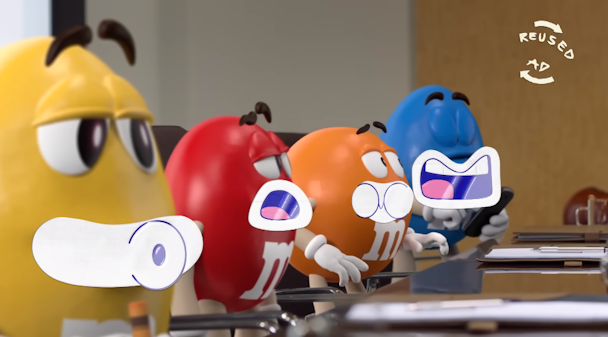How to tell if your sustainability ad is a waste of energy
Thomas Kolster’s back with some advice for Mars on sustainability comms.

Mars’s latest campaign, ‘Healthy Planet Productions,’ recycled and over-dubbed old ads from M&Ms, Twix and Ben’s Original to make a point about sustainability. My message to Mars is, just please don’t and thank you for showing us what not to do.
But, it’s easy to ridicule when brands get sustainability wrong or point fingers, but let’s be productive and learn from the missteps.
Here are four lessons I took from the campaign.
Are you window-dressing or changing something?
Last week, Mars launched a series of commercials focusing on its efforts to cut greenhouse gas emissions and aiming for net zero for some future generations to enjoy beyond 2050. The timing of the campaign is baffling as concerned citizens worldwide are looking to our elected world leaders to act on the climate emergency, and then someone at Mars thought it would be a great idea to shine a light on its emissions efforts because…?
Advertisement
How does Mars compare to others in the industry? Or compare to other chocolate brands? It’s classic virtue signaling, something we have seen from brands like Budweiser with their Super Bowl commercial 'Wind never felt better.’
What’s the business case?
The least we can expect from our colleagues in advertising when they invest in efforts like those above is for them to answer the simple question: What’s the business case?
Is Mars desperately trying to get a higher sustainability rating? Yes, that will work because advertising works. If actions don’t correlate with the green image it is trying to build, the marketing investment is more like blowing into a balloon: it’ll burst at some point. Another reason brands talk about climate is to attract a younger climate-conscious target group.
Advertisement
Yet, with all the issues facing chocolate, it’s simply bringing attention to the lesser of two evils. A key narrative in the Mars commercials is how it has recycled old ads … wow, what a minuscule emission saving. When you can align the business with the sustainability case, it’s all kinds of good and not just a good story.
Lesser of two evils?
An often-used trick from the (greenwashing) playbook is to focus on what has little impact, such as when Dell computers communicate about its recyclable packaging to divert attention from bigger issues such as build-in obsoleteness or recycling of laptops. In one of the ads, Mars is talking about sourcing 50% renewable energy, we're not talking carbon-intensive steel or concrete, but chocolate. And you couldn’t make it to 100%?
Maybe you could begin by bringing renewables to your chocolate farmers and their families, who are in dire need of energy security, affordability, and reliability?
Suggested newsletters for you
If you want to attract a young, hip, climate-conscious target group, you could tell them how chocolate farming could change and embrace more regenerative and bio-diverse practices. Or how paying chocolate farmers more secures the natural habitat around them? All climate stories that are more novel, interesting (and pressing).
Choose your media wisely.
Instead of producing (oh, sorry, I meant recycling) and running yet another 30-second ad, Mars, you could ask yourself a better question: How can you touch people at the right time, place and situation when they’re the most attentive?
You could have written your commitment or achievements on the packaging and told a bigger story about your climate vision? Or you could have communicated this to retailers or other stakeholders (if that’s your primary target group?), but why waste my time on this?
Say a water brand wants to share more about its commitments around water conservation, then a reusable water bottle could be a good medium. In general, if you go extensive with your media choice, make sure you have a real impactful story to share.
All of that said, at least Mars tried and taught us something. And hey, it got the tone of voice right when applying humor, so it wasn’t all doom and gloom. It felt right for the category. Mars, if your aim was to save emissions you shouldn’t have done this ad in the first place. I’m recycling my point from the very beginning.

